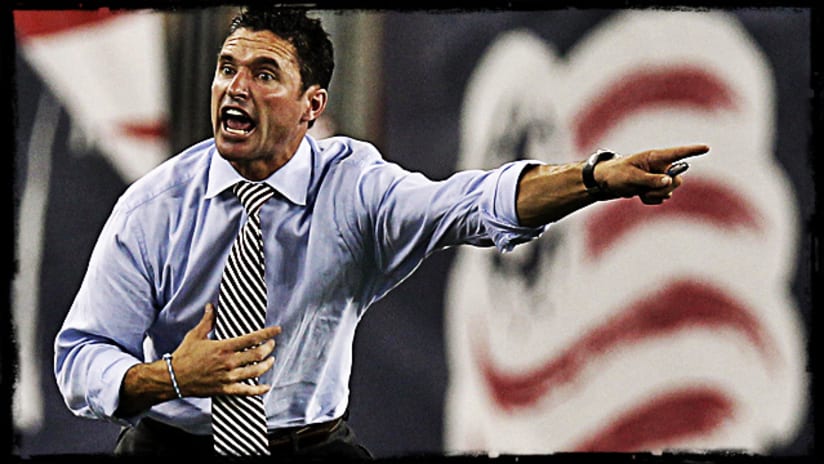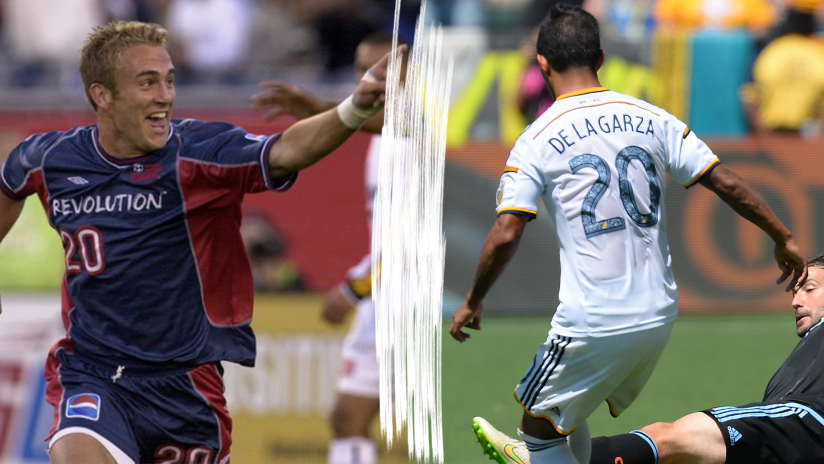The following story was published in the Revolution’s “Match Day” program for the September 5 game against the Columbus Crew
FOXBOROUGH, Mass. – Jay Heaps’ day typically starts around 5:45 a.m.
That’s when Heaps wakes up and begins preparing. He’s always preparing. He makes the drive to Foxborough on largely empty roads while much of the East Coast sleeps, arriving at his Gillette Stadium office before 7 a.m. That’s when the work begins.
Heaps loves to watch film. He analyzes opponents and devises game plans to exploit potential weaknesses. He breaks down the Revolution’s performances and evaluates areas of improvement. He does this for an hour between 7 a.m. and 8 a.m.
The full coaching staff gets together around 8:30 a.m. to plan out the day’s training session. Which players are limited by injury? Which players will be grouped together? How long will each portion of the session last? Everything with a purpose.
The players arrive at approximately 9 a.m. and by 9:15 a.m. – depending on the day of the week – they’re engrossed in film study. Tuesdays are reserved for self analysis. Thursdays focus on the opposing team. Fridays spotlight set pieces. Heaps walks them through it all.
Training lasts from 10 a.m. to 12 p.m., but for the coaching staff, hours of additional film study and meetings are still to come. Heaps typically leaves the office somewhere between 4:30 p.m. and 6:30 p.m.
When he gets home, Heaps spends a few precious hours with his family: his wife, Danielle, and their three children, Jack (7), Olivia (5) and Jude (1). Family has always been at the top of Heaps’ priority list.
But before he crawls back into bed, there’s more work to be done. Heaps spends another chunk of time from 9 p.m. to 10:30 p.m. catching up with news around MLS and doing a bit more film study. Just in case.
“This is a job that you can’t turn off, ever,” said Heaps. “And I don’t ever want to turn it off.”
Although he can’t turn it off, Heaps does occasionally try to change the channel if only to avoid driving himself insane. A perfectionist to the core, it’s difficult for Heaps to ever feel like he’s done everything in his power to prepare for a game. Convincing himself that he can do no more has been one of the biggest adjustments he’s had to make since taking over as the Revolution’s head coach.
“On game days I’ll usually take a good couple hours to try to break away from thinking about it too much because those days are hard,” said Heaps. “Friday nights if I continue to think about it I’d go crazy … There’s only so much you can do as a coach. You can’t go out and play the game. So you have to feel good in your preparation.”
Heaps is still getting used to not being able to go out and play the game. For a decade that’s exactly what he did, retiring in 2009 after a nine-year stint with his hometown Revs. Between the lines, Heaps knew his actions could have a direct impact on the outcome.
Of course, that’s still the case as the head coach – most would argue even more so – but Heaps has faced a serious challenge in accepting that his role is now more mental than physical.
“When you’re a player, you feel like there’s going to be something you can control,” said Heaps. “As a coach, you have to kind of let that control go. Not control of the team, but control of physically doing something to change the game. It really becomes a much more mental approach of how to go into a game.
“I prepared my whole life how to play in a game, so when you’re coaching that game, you have to understand that how you’re going to alter the game isn’t going to be physical. It’s going to be the right coaching sub, it’s going to be the right tactical change, or it’s going to be watching the game from the right perspective.”
There are some things which haven’t changed from Heaps’ playing days. For example, he still can’t sleep after games, win or lose. Sometimes it’s because he’s up thinking about a difficult result, but more often than not he simply needs time to release the energy built up throughout the course of a game.
“I don’t typically sleep much after games and I never have,” said Heaps. “Even when I was a player, I never did. It’s hard. It’s not so much thinking about the game, it’s the adrenaline of the game and it’s the emotion of the game.”
But even if Heaps can’t sleep on Saturday night, it won’t stop him from getting up on Monday morning and doing it all over again. He can’t help himself. It’s out of his control. And there’s only one reason anyone would ever dedicate themselves to a job so consuming, so emotional.
“The love of it,” said Heaps. “Monday morning, when your alarm goes off, if you’re excited and you want to get to work as soon as you can and you’re thinking about your day, that’s motivation in itself … I hate [losing] and that’s part of what drives me up in the morning. I feel like I won’t sleep until we get this team in the playoffs, in the hunt as a contender. That’s where this is going. I’m not going to sleep until that happens.”











